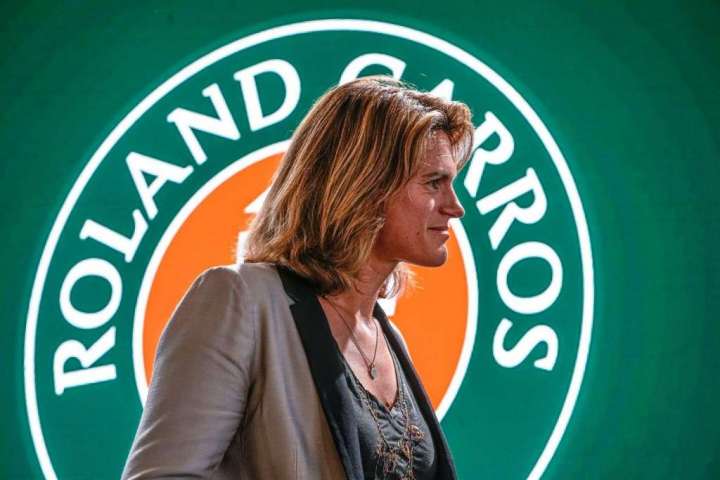PARIS — For 30 weeks in 2006, France’s Amélie Mauresmo was No. 1 in the world, a champion of that year’s Australian Open and Wimbledon.
French Open director Amélie Mauresmo: Women’s matches are less compelling

“In this era that we are in right now, I don’t feel — and as a woman, former women’s player, I don’t feel bad or unfair saying that right now you have more attraction, more attractivity — Can you say that? Appeal? — for the men’s matches,” Mauresmo said when asked about the gender imbalance in the scheduling of the featured night matches.
Top-ranked Iga Swiatek called Mauresmo’s comments “a little bit disappointing.”
Swiatek, a 21-year-old who extended her winning streak to 33 matches with a 6-3, 6-2 victory over American Jessica Pegula to clinch a spot in the semifinals, said she believes the question of whether men’s tennis is more interesting is a matter of opinion.
“I think women’s tennis has a lot of advantages,” she said. “Some may say [that] it’s unpredictable and girls are not consistent. But on the other hand, it may also be something that … may really attract more people. … For sure I want to entertain, and I also want to show my best tennis on every match. But, yeah, [Mauresmo’s remarks were] a little bit disappointing.”
Pegula, 28, who will move into the top 10 of the rankings after her career-best French Open result, also characterized Mauresmo’s comment as “disappointing.”
“It’s not something you want to hear,” the No. 11 seed said. “I think at the same time we need to have chances to have really good matches to show that it is a good product as well.”
Pegula, who is in the women’s doubles semifinals with Coco Gauff, said she thought the depth in women’s tennis was an asset, along with players’ personalities that she felt fans would enjoy if given the chance to get to know them.
“I feel like so many people love watching women’s tennis because, you know, we don’t have huge serves. We’re not acing,” Pegula said. “There’s not a lot of super, super quick points. There’s more rallies. There’s more drama.”
This is the first year the French Open is staging night sessions — 10 in all — and requiring fans to buy a separate ticket to attend. Only one match is contested during the night session — the so-called “Match of the Day,” which is staged on 15,000-seat Court Philippe-Chatrier and does not begin until 8:45 p.m.
Dissatisfaction with scheduling among players and fans alike was apparent in the first week of the tournament. It came to a head following Tuesday’s men’s quarterfinal between Rafael Nadal and Novak Djokovic, which didn’t start until 9 p.m. and ended at 1:15 a.m. Afterward, Nadal and Djokovic said they felt 9 p.m. was too late to start a best-of-five-sets match.
Mauresmo’s scheduling also raised questions of gender bias. She chose nine men’s matches and one women’s match as the featured nighttime match, effectively rendering most of the women’s matches as the “undercard” to the men’s main event.
Pam Shriver, a 22-time Grand Slam doubles champion, said she understood that the tournament director’s role is to ensure the event’s financial health, and she could see an argument for favoring best-of-five-sets matches during night sessions if only one match were offered.
“But one women’s match to nine men’s?” she asked. “That’s ridiculous.”
Shriver questioned why none of Swiatek’s matches were chosen for a night session, given her ranking and winning streak, which has been eclipsed this century only by Venus Williams’s 35 straight victories (2000) and Serena Williams’s 34 (2013). What troubled Shriver most was the rationale Mauresmo gave.
“Why did she have to insult women’s tennis?” Shriver asked. “It really hurts to have an alumni player, who’s now a tournament director, who made history as a female coach of a top men’s player [Andy Murray], really diss women’s tennis the way she did. … This is a two-time major winner, someone who is in the Hall of Fame, who is crossing a line that is not acceptable. It was not necessary. … Her words today were inexcusable for a leader.”
Mauresmo’s comments came during a news conference in which she was asked about her scheduling decisions. She explained that when she was planning the daily schedule for the 15-day event, she looked for women’s matches that she felt had star power and appeal for ticket-buyers and broadcasters alike.
“I admit, it was tough,” Mauresmo said.
The lone women’s match Mauresmo chose for the night session was a second-round clash between French veteran Alizé Cornet and 2017 French Open champion Jelena Ostapenko of Latvia.
“It was tough for more than one night to find, as you say, the match of the day,” Mauresmo said. “When you have this — it’s an interesting one because, as I was saying, the fact that it’s right now a one-match night session is tough on this. It is tough.”
Mauresmo’s pro career, which ran from 1993 to 2009, overlapped that of many of the women’s game’s most marketable stars, including the Williams sisters and Maria Sharapova. After retiring, she expanded women’s roles in tennis as coach of former world No. 1 Murray. In December, she was named director of the French Open by the French Tennis Federation. She is the second woman to take the reins of one of the sport’s Grand Slams; the U.S. Open named Stacey Allaster its first female tournament director in 2020.
Women’s tennis has had an exodus of top talent in the past 12 months. Serena Williams, a 23-time Grand Slam champion, hasn’t competed since her first-round loss at Wimbledon last year. Now 40, she has yet to announce plans for her return.
In March, Ashleigh Barty, a three-time Grand Slam champion, shocked the sport with her abrupt retirement at 25 while the world’s top-ranked player. Her decision came just months after she won the Australian Open.






